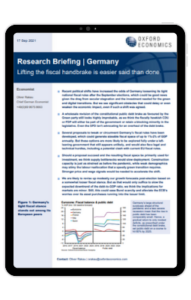Germany | Lifting the fiscal handbrake is easier said than done

Recent political shifts have increased the odds of Germany loosening its tight national fiscal rules after the September elections, which could be good news given the drag from secular stagnation and the investment needed for the green and digital transitions. But we see significant obstacles that could delay or even weaken the economic impact, even if such a shift was agreed.
What you will learn:
- A wholesale revision of the constitutional public debt brake as favoured by the Green party still looks highly improbable, as we think the fiscally hawkish CDU or FDP will either be part of the government or retain a blocking minority in the legislative. Even the SPD isn’t advocating for an overhaul of the debt brake.
- Several proposals to tweak or circumvent Germany’s fiscal rules have been developed, which could generate sizeable fiscal space of up to 1%-2% of GDP annually.
- Should a proposal succeed and the resulting fiscal space be primarily used for investment, we think supply bottlenecks would slow deployment.
Tags:
Related Services

Post
House prices continue to slide for China’s cities
Research Briefing Germany | Lifting the fiscal handbrake is easier said than done While the property market downturn has been universal, the scale and depth has been varied for different cities and regions.
Find Out More
Post
The Construction Productivity Challenge in Australia
Delve into the state of construction productivity in Australia. Understand the factors affecting growth and how innovation can transform the industry for the better.
Find Out More